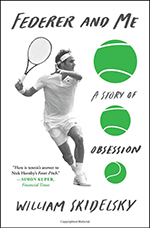My Federer Obsession
William Skidelsky

I first saw Roger Federer play in 2003. At Wimbledon on Centre Court. It wasn't love at first sight.
During the first week of the tournament, I received a call from a friend. He had a spare ticket for the next day. Would I like to go? Although I wasn't a big tennis fan back then, it was an offer I felt I couldn't refuse.
The only problem was practical. How to get out of work? I'd recently started a job as junior books editor on a weekly current affairs magazine, and the day in question--a Thursday--was our deadline. Moreover, my boss was away, leaving me, for the first time, in sole charge of our section.
After giving the matter some thought, I decided that a course of brazenness would be best. I would simply leave--as if heading out for an important meeting. The next day, at noon, I sidled out of our offices, took a Tube to Waterloo, and, from there, caught a train to southwest London. Predictably, my plan was foiled, in the sense that my absence was noticed, and resulted in a ticking off. But I've never had any regrets.
It was one of those indecisive early summer days when both sun and rain seem equally plausible. When I got to the All England Club, the first match of the afternoon was already in progress. It was between the fourth seed, Roger Federer, and a left-handed Austrian called Stefan Koubek.

I'd heard that Federer, then twenty-one, was an up-and-coming talent, but aside from that I knew nothing about him.
My first impression was that, physically, he wasn't terribly prepossessing. He had a ponytail, which, in conjunction with the fat white swathe of his headband, seemed to bring out the squishiness of his features.
There was a hint of fluff on his upper lip. Despite his all-white attire, he looked like he belonged not on the lawns but on the beach--or in some central European heavy metal band. The groomed, chiseled icon hadn't yet emerged from the shell of youth.
I arrived near the end of the first set, which Federer won 7-5, saving a set point. The next two sets were much more one-sided: Federer lost a game in each. There was a savagery to his destruction of Koubek, but it was savagery of a particular kind, combining raw power with a delicacy of movement and touch.
While his opponent lurched and lumbered, Federer danced around the court in quick, light steps, never seeming to be out of position. His feet were virtually soundless, as if the effort cost him nothing. And this impression of calm was reinforced by his demeanor, which was curiously expressionless, almost a blank.


I remember that all this came as a surprise--even a shock to me. For it wasn't what I'd been expecting. Tennis, which when I was a boy had been massively important to me, had faded from my life, partly because of a growing sense that the game was no longer what it had been.
Where once matches had involved artistry and guile, now they tended to be contests of strength. On the slick grass of Wimbledon, they would pass in a flurry of booming aces and unreturned serves. On slower courts, they would consist mainly of pounding baseline rallies. Yet here was Federer successfully deploying a different approach, one redolent of an earlier, subtler era.
Yes, his game was powerful, but it relied on timing rather than muscle. It had a precision, a sense of craft, that brought to my mind not only the greats of my boyhood--McEnroe, Edberg, Mandlikova, Graf--but also, reaching further back, the figures I'd glimpsed in grainy black-and-white footage, and in the books I'd pored over as a child: Rosewall, Bueno, Gonzales, Laver.
The afternoon's other matches were more in line with my expectations. Venus Williams swatted aside some hapless Belgian. Then came Greg Rusedski versus Andy Roddick, the day's headline contest. Roddick was another young gun of whom much was expected. In America, he was viewed as heir to Pete Sampras and Andre Agassi.
And he was certainly more immediately noticeable than Federer, with his whipper-crack serve and air of anxious bustle. But his match with Rusedski--predictably ace--strewn-was boring. I found neither player remotely enticing.

The one moment of real drama was a line dispute. On a key point in the third set, with Roddick serving, someone in the crowd yelled "Out!" when one of the American's shots landed near the baseline. Rusedski, thinking the call genuine, stopped playing.
The umpire had no option but to hand Roddick the point, but when he did this Rusedski's frustration, which had been building all afternoon--he was down two sets-unleashed itself in a lengthy, foul-mouthed tirade. "I can't do anything if the crowd fucking calls it ... Replay the point ... Some wanker in the crowd changes the match and you allow it to happen. Well done! Well done!"
The crowd, I remember, mostly responded with jeers and whistles. The ex-Canadian Rusedski may have been "one of us," but it was clear that he would never replace Tim Henman in our affections.
What I took away from the afternoon was the memory of Federer stooping low against the grass, spearing a backhand up the line, and of the contrast between the gentle-seeming lean of his serve and the percussive crack as the ball once again whipped into the back fence for an ace.
Those images stayed with me as, over the following week and a half, I monitored his progress through the tournament, telling anyone who would listen how good I thought he was.
In Federer's career, Wimbledon 2003 was a hinge moment, the point when his promise finally came to fruition. With each match, his confidence billowed, as if he were discovering, for the first time, the full reach of his talents. In the fourth round he beat the young American Mardy Fish in four sets.


In the quarters he saw off the gangly Dutch eighth seed, Sjeng Schalken, in three. And then, in the semifinals, he raised his game to extravagant heights to crush the player who seemed most likely to impede his progress: Andy Roddick.

I remember watching that match on TV. After a tight first set, which Federer won on a tiebreak after (again) saving a set point, Roddick was swept away in a torrent of balletic volleys and lancing ground strokes.
I was amazed by the ease with which Federer neutralized Roddick's serve, whose up-close ferocity I'd observed for myself a week earlier. He always seemed to know where it was heading, and parried it back seemingly with time to spare.
His passing shots, too, were lethal. Countless times, Roddick sent the ball to the corner and headed for the net, only to be left stranded by the sort of whipped, short-angled ground stroke that became a Federer trademark. So comprehensively was Roddick outplayed that he was frequently made to look inept, foolish.
Two days later, Federer faced another big server, the towering Australian Mark Philippoussis, in the final. To no one's great surprise, he won in straight sets. Though I didn't watch the match, I remember taking a pleasure in Federer's victory that was, at least in part, egotistical. It proved that my initial reaction had been correct, that my man really was something special.
This self-congratulatory impulse, I now realize, was absurd: it wasn't as if he was totally unheard of. Yet immediately after that tournament, my attention drifted away both from tennis and from Federer, and my life resumed its previous course. I went back to the world of editing, of journalism, of building a sense of myself as an adult. For what now strikes me as a strangely long time--roughly three and a half years--I gave little thought to Federer at all.





